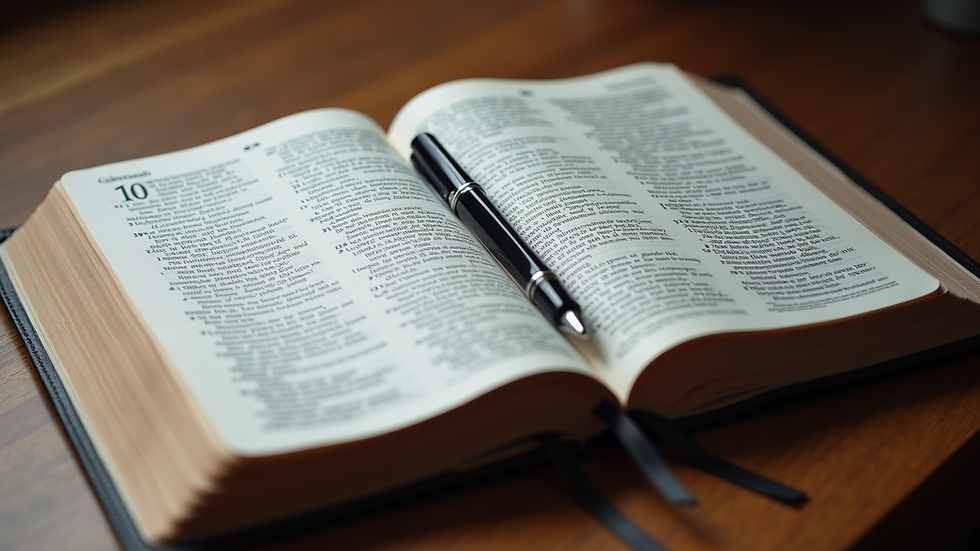How to Deepen Your Understanding Through Personal Reflection
- Dr. Bob Crowder

- Aug 4, 2025
- 3 min read
Personal reflection is a powerful tool for growth and learning. It allows you to pause, think deeply, and gain insights that can transform your perspective. Whether you want to improve your decision-making, enhance your emotional intelligence, or deepen your spiritual journey, personal reflection can help you achieve these goals. This article explores practical ways to cultivate personal reflection and use it to deepen your understanding in various areas of life.
The Importance of Personal Reflection
Personal reflection is more than just thinking about your day or recalling events. It involves a deliberate process of examining your thoughts, feelings, and actions to understand their meaning and impact. This practice helps you:
Identify patterns in your behavior and thinking
Recognize your strengths and areas for improvement
Clarify your values and beliefs
Make more informed decisions
Develop empathy and self-awareness
For example, after a challenging conversation, reflecting on what was said and how you responded can reveal insights about your communication style and emotional triggers. This awareness can guide you to handle similar situations better in the future.

One effective way to engage in personal reflection is through journaling. Writing down your thoughts helps organize them and makes it easier to spot recurring themes. You can start by asking yourself questions like:
What did I learn today?
How did I feel during that experience?
What could I have done differently?
Answering these questions honestly can deepen your understanding of yourself and your experiences.
How to Practice Personal Reflection Effectively
To make personal reflection a meaningful habit, consider the following steps:
Set aside dedicated time - Choose a quiet moment each day or week to reflect without distractions.
Create a comfortable environment - Find a peaceful spot where you feel relaxed and focused.
Use prompts or questions - Prepare a list of questions that encourage deep thinking.
Be honest and open - Avoid judging yourself; instead, approach reflection with curiosity.
Record your insights - Write down your reflections to track your progress over time.
Apply what you learn - Use your insights to make positive changes in your life.
For instance, you might spend 10 minutes each evening reviewing your day and noting what went well and what could improve. Over time, this practice builds self-awareness and helps you grow.

Incorporating mindfulness techniques such as deep breathing or meditation before reflecting can also enhance your focus and clarity. These practices calm the mind and prepare you to engage more deeply with your thoughts.
What is personal Bible study?
Personal Bible study is a form of reflection that involves reading and meditating on scripture to gain spiritual insight and guidance. It is a private, intentional practice where individuals seek to understand the Bible’s teachings and apply them to their lives.
This type of study encourages asking questions like:
What does this passage mean?
How does it relate to my life?
What lessons can I learn from it?
Engaging in personal Bible study can deepen your faith and provide comfort and direction during difficult times. It also fosters a closer relationship with your beliefs and values.

For those interested in exploring this further, resources on personal bible studies offer guidance and tools to help you get started or deepen your practice.
Benefits of Deepening Understanding Through Reflection
When you commit to personal reflection, you unlock several benefits that enhance your life:
Improved decision-making: Reflecting on past choices helps you make wiser decisions in the future.
Greater emotional intelligence: Understanding your emotions leads to better self-regulation and empathy.
Enhanced problem-solving skills: Reflection encourages creative thinking and new perspectives.
Stronger relationships: Being aware of your behavior and its impact improves communication and connection.
Increased resilience: Reflecting on challenges builds mental strength and adaptability.
For example, after reflecting on a conflict with a friend, you might realize that listening more carefully could prevent misunderstandings. Applying this insight can improve your relationship and reduce stress.
Practical Tips to Make Reflection a Daily Habit
Building a daily reflection habit can be simple and rewarding. Here are some practical tips:
Start small: Begin with 5 minutes a day and gradually increase the time.
Use technology: Apps and digital journals can remind you to reflect and store your notes.
Combine with other routines: Reflect during your morning coffee or before bedtime.
Be consistent: Try to reflect at the same time each day to build a routine.
Share with a trusted friend: Sometimes discussing your reflections can deepen your understanding.
Remember, the goal is progress, not perfection. Even brief moments of reflection can lead to meaningful insights.
By integrating personal reflection into your daily life, you open the door to deeper understanding and growth. Whether through journaling, meditation, or personal Bible study, this practice enriches your mind and spirit. Start today and watch how your perspective and life transform over time.




Comments